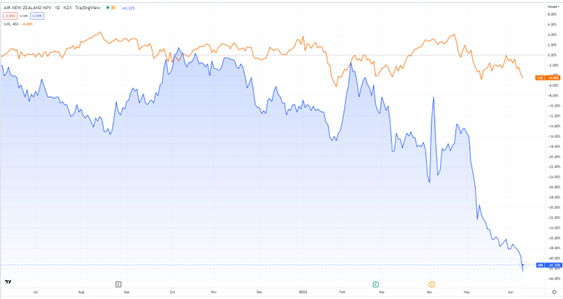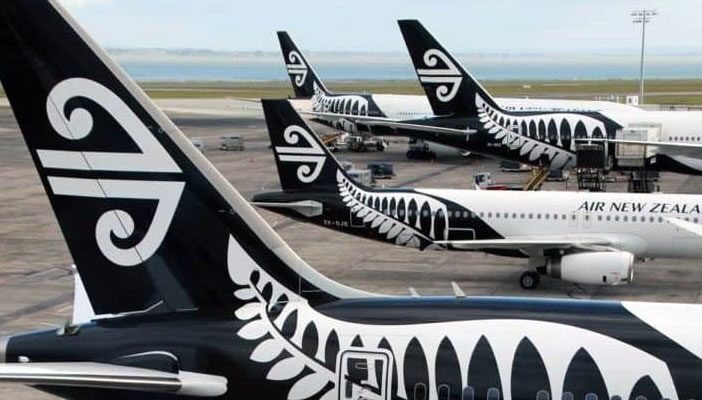Air New Zealand [ASX:AIZ] confirmed it expects to make a net loss of less than $750 million in FY22.
The expected net loss is better than the previous forecasted net loss of $800 million.
AIZ shares were down 3.5% late on Friday.
AIZ shares are down 60% for the year, hurt by extended New Zealand lockdowns and now fears of rising living costs crimping travel demand.
Rising jet fuel prices aren’t helping things either.

Source: Tradingview.com
Air New Zealand Update: FY2022
On Friday, Air New Zealand made a brief update to its FY22 outlook.
Previously, the travel stock expected its FY22 net loss before significant items to be less than $800 million.
In early May, AIZ announced that trading conditions were improving and that the forecasted net loss may be lower.
On Friday, AIZ quantified that improvement.
The company now expects its net loss before significant items to be less than $750 million.
Air New Zealand said it’s seeing ‘strong passenger booking activity on short haul and international services following the opening of the New Zealand border’.
Domestic travel also improved.
AIZ said business-related travel demand is ‘returning to approximately 90% of pre-Covid levels’.
AIZ share price outlook — the bigger picture
AIZ admitted the macro environment remains cloudy:
‘The airline remains mindful that the macroeconomic environment continues to be uncertain with disruptions caused by the impact of covid variants, continued travel restrictions in some markets, and the ongoing conflict in Ukraine contributing to high jet fuel prices.’
In February, AIZ reported loss before tax was $376 million for the half year period.
Operating revenue was down by 9%, which was attributed to a 26% decline in passenger revenue due to travel restrictions and a 107-day Auckland lockdown.
During the half, AIZ’s fuel costs rose 14% to $174 million. This is likely to rise further in the coming half.
Air New Zealand may be seeing some improvements in its bookings while it continues to manage loss, but investors aren’t quite ready to put their toes back in the water just yet.
AIZ Chair Dame Therese Walsh said of the results:
‘The 2022 financial year has and will continue to be much more heavily impacted, both by continued suppressed demand and rising costs.
‘As we’ve all seen at the petrol pumps, the cost of fuel has been significantly increasing – and although we have hedging strategies in place, we expect to see these rising costs start to come through in the second half and beyond.’
Once COVID and its restrictions become a thing of the past, and the great energy dilemma reaches its peak; what will these dumped-on stocks be worth then?
Now, if the air-travel industry doesn’t appeal, other opportunities abound.
But only if you know where to look.
Our small-cap expert Callum Newman has a strategy for picking-out ‘left-for-dead’ stocks that could bounce back hard.
Learn about Callum’s ‘grave-dancer’ style here.
Regards,
Kiryll Prakapenka

